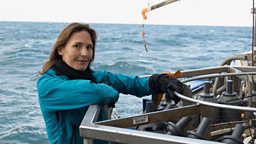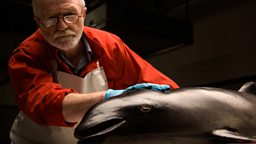Seven things you need to know to live in harmony with the ocean
By Dr Helen Czerski, oceanographer and co-presenter of Ocean Autopsy, 8th June on ���˿��� Four at 9pm.
We call Earth a “Blue Planet”, but we almost never think about that blue. It isn’t just the empty bit between all the continents. It’s a beautiful and dynamic engine, a spherical shell of water that is almost giving the planet a hug as it shunts heat, energy, nutrients and life around our planetary life support system. We haven’t always treated it well, and Ocean Autopsy was a fantastic opportunity to investigate the harm we’ve done in the past, and the potential for happier times in the future. It’s great that people are finally talking more about our seas, but talking alone isn’t enough. I think that the whole human relationship with the ocean needs a reset. So if you’re keen on living sustainably with our oceans, what do you need to know? I’ve compiled a handy list.

1. It’s not “somewhere else”
We are all directly connected to the ocean, even if we don’t live near it. Heat energy from the ocean plays an important role in fuelling the weather that we experience on land. Just the existence of the ocean keeps our climate more stable than it would otherwise be, because it acts as a huge heat reservoir, buffering us against changes in energy arriving from the sun and later being lost out into space. The ocean is currently doing us one particularly enormous favour: it’s absorbing around 30% of the excess carbon dioxide that we’re putting into the atmosphere. We would be way past the Paris climate target of keeping global warming well under two degrees already, if it weren’t for that helping hand. And there are links which are perhaps more surprising. When they swim upstream and die after spawning, salmon bring nutrients from the ocean back to land, fertilising whole forests. We live in the shadow of the ocean, not the other way around.
2. It really is critical for keeping us alive
I think that each of us has three life support systems: our own body, our planet and the infrastructure of our civilisation. Planet Earth is our floating spaceship, carrying everything that we need to survive. The atoms are recycled round and round (we very rarely get any new ones from space) and Earth’s physical engine and its ecosystems maintain the environment that we need to survive. The ocean is the heart of this system, connecting different parts of our planet.

3. Life underwater is not like life on land.
We assume that the sort of life we see on land is how life has to be. But things work differently in the ocean, and so we often underestimate them. As just one example, photosynthesis is the process of harvesting the sun’s energy to build sugars and other biological molecules. On land, this is mostly done by plants. Land plants are large (in the case of trees, enormous), they’re stationary, and they can live for many years. But in the ocean, things work differently. The sun-harvesters are phytoplankton, single-celled organisms that may only live for a week or two. They pop up and disappear very quickly, and they’re too small to see. But almost half of all photosynthesis on Earth happens in the oceans, so those tiny fleeting cells are doing an enormous job. You could be swimming in the ocean equivalent of a rainforest and not be able to see it. But the phytoplankton can be so numerous that they change the colour of the water and then we can see them from space.
4. Ocean, not oceans
In the past, geography textbooks taught everyone that there are five oceans. But this doesn't really make sense once you look properly, because they are all joined together. The global ocean is a single system, and the components of the fluid engine flow over and under and sometimes through each other without any regard to boundaries. If you put your hand in the sea in Brighton, you are directly connected to Antarctica, to the coastline of Brazil, to giant waves carrying surfers in Australia and to the South China Sea. A single bluefin tuna can voyage through all of that without batting an eyelid (not least because fish don’t have eyelids). Over a few hundred years, water can travel from the North Atlantic to the Southern Ocean and from there to India, Australia and beyond. We have one global ocean, not lots of separate oceans.
5. Life is a part of the physical and chemical engine of the ocean, not separate to it or something that just lives in it
Life doesn’t just live “in” the ocean. It’s a critical part of how the whole thing works. As just one example, whales tend to eat at depth in the ocean, but they come back to the surface to breathe. And when they breathe, they also poo. So they’re constantly bringing nutrients from deeper waters up to the surface. Seals often do the same. Some people have complained that whales compete with fishermen for fish, but actually they’re more likely to be bringing up the nutrients that will fertilise whatever the fish is eating.

6. Stop comparing it to the Moon
Versions of the phrase “we know more about the surface of the Moon/Mars than the ocean” are past their prime. The problem with this phrase is that it implies that once you have drawn something on a map, you know everything that there is to know about it.
It is true that we have maps of the surface of the Moon to a higher resolution than our maps of some parts of the ocean. But here’s the thing: the Moon isn’t doing very much, or changing very much. A map of the Moon gets you a long way. But the ocean is changing all the time, and these processes (currents, underwater landslides, migrations of fish and plankton, seasonal cycles in food and more) matter.
Comparing all that activity to the Moon is like looking at a city on a map and saying that since you know where the major roads are, you know everything that’s important and can move on. The ocean, like cities, is full of interwoven stories. There is plenty still to explore.
7. We have forgotten, but others haven’t
Our western world has lost touch with the ocean, but plenty of indigenous communities never did. The ocean is a deep-rooted part of their tradition and their sense of self, especially for the Polynesians and the many Arctic communities. Quite often they still spend a lot of time on the ocean, watching the details and feeling things change as the ocean changes. They experience it in a way that we often don’t, and although it’s not the same sort of knowledge as science, it’s still very important. As we re-build our relationship with the oceans, listening to those voices and learning from them is a critical part of the process.
Ocean Autopsy sets out the scale of the challenge. But I believe that we are capable of re-building our relationship with the ocean and creating a much more positive future. The first step is understanding, and the second is taking action. We are all part of this planet, and our individual actions all have consequences. Together, we can make sure that the future of the oceans is better than their present.
is on ���˿��� Four and iPlayer on Monday 8th June at 9pm.
